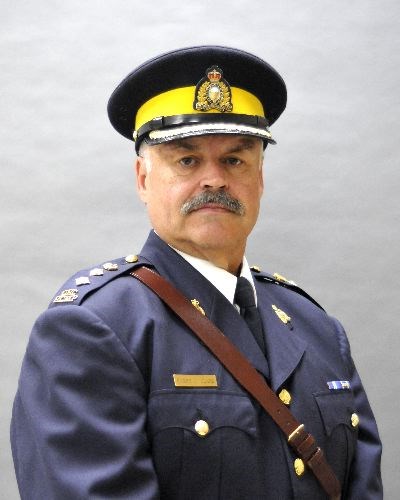The senior officers at RCMP North District Headquarters all dressed in traditional Mountie riding breeches and High Brown boots on Wedesday.
It was a salute to Chief Supt. Barry Clark, the RCMP's commander of B.C.'s northern region. Commander, that is, until the end of that day.
Clark retired to his Prince George farm after 38 years and two days in the RCMP. He told The Citizen that had the force asked him to reconsider, he would have dropped his retirement plans instantly.
He could still remember the day the plan to join the RCMP emerged out of his Grade 10 fog. He was on a 6 a.m. run with his high school football team in Lacombe, Alberta. Clark, as usual, came last.
Coach Gustafson was like a drill sergeant, ordering him to do pushups and barking insults about his lack of discipline. As Clark lay there, a police car appeared out of the morning.
"I'm going to be a Mountie," he huffed between pushups.
"You don't have what it takes to be a man in that uniform," snarled the coach.
The challenge was on.
Clark was two years into a zoology degree when he got called to the national training depot in Regina. He told his mom who was fearful for his safety he was only going for training, and then only for the first two-year posting so he could save up enough money for the rest of his university tuition.
That first posting was Hazelton, an area dense with First Nations, which ignited his own dormant aboriginal roots.
With postings in Ottawa, Alberta, the far north, and finally to Prince George in 1994, he was promoted to superintendent in 2005, taking charge of a police region so large it eclipses many countries. He was promoted again in 2007, becoming the first and only chief superintendent northern B.C. has ever known.
AIDED BY SATELLITES BUT STILL GUIDED BY STARS
Clark's career straddled two distinct eras. The first half of his career gave him frontier policing experiences akin to Sam Steele or Wop May. The second half of his career pitted him against sophisticated gangs armed with assault rifles and GPS technology, evidence of homicide and sex offenses encrypted in computer data, and domestic terrorism in small towns.
In his far north days he helped deliver babies, aided in the re-attachment of an Inuit man's toe severed in an axe mishap, went on a 600-mile snow patrol, inoculated 1,000 ornery sled dogs at a time, speared seals through ice holes, and survived with a guide group in an emergency igloo thrown up against a blizzard at -50 C degrees.
But his early lessons were often the subtle moments, he said, like stopping to listen to an aboriginal elder scratch out canoe instructions in the sand only moments before Clark paddled out into Teslin Lake.
Or in 1978 at his outpost on Sanikiluaq Island when a hunter showed up with more than 1,200 dead geese, attracting the entire village. Clark knew this to be a flagrant contravention of the Migratory Birds Convention Act he was sworn to uphold. As the only Mountie within hundreds of miles, he approached the gathering intent on arrest and seizure.
A woman he knew, one of the few in the community who could translate, pulled him aside and told him to just allow the situation to unfold "or you're going to get hurt."
As it turned out, the hunter was the designated bird gatherer for the entire Inuit village. Each person got only their lawfully allotted amount, but did so through a central hunter while the others did other essential work to prepare for winter. Had Clark intervened, an entire village's food supply would have been crippled and so would their trust of any Mountie from then on.
Clark backed the communal hunt up to his superiors, as he did again when a pod of beluga whales got stranded in the ice. The village wanted to harvest the whales for food and tools, lest their lives be wasted.
"That issue made it all the way to the floor of the House of Commons" and won the ire of Greenpeace but harvest they did.
For the RCMP's future success, he said, individual Mounties and the national organization had to keep surging into the realm of high technology and aggressive intelligence-gathering, but not forget the human touch. That was the reason for putting on the uniform every morning in the first place, he said, in case any of today's kids are doing pushups in a fog wondering what future uniform they should aspire to.


